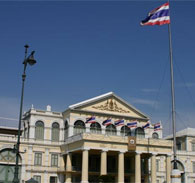Updated on Jul 10, 2007
Lesbians, gays and transgenders in Thailand will not be protected under the country's new constitution as the constitutional drafting assembly said last week that the reopening of the gay issue had been done incorrectly. As such, the ruling renders the initial decision invalid. updated on Jul 10
==============================================
Posted on Jul 4, 2007
The Thai government's Constitutional Drafting Assembly (CDA) adopted language to ensure equal rights for gays, lesbians and transgendered people on Friday, June 29. The draft constitution expressly refers to people of "other sexual identities," which activists involved in the process said was understood to include transgendered (kathoey inThai) as well as gay men and lesbians.

Prominent in the work were pioneer activists Naiyana Supapueng of National Human Rights Commission, "Lek" Chantaluck Raksayoo from Sapaan Group, Natee Theerarojnapong of the Gay Political Group of Thailand, and Anjana Suvarnananda. Anjana, better known as Tang, heads the Anjaree lesbian group, worked closely with the National Human Rights Commission (NHRC), prompting the Commission to include LGBT rights in its submission to the CDA. Other gay advocacy groups involved include the Rainbow Sky Association and Bangkok Rainbow.
Since its creation under provisions of the progressive 1997 Constitution, the NHRC has consistently worked on LGBT issues, though with little public recognition.
Recognition of LGBT rights has become more visible in Thailand because of recent cases. One involved a challenge to the Thai military for classifying kathoey as suffering from permanent medical problems. The well-publicised case was backed by the National Human Rights Commission, and is now before the Administrative Court.
A current case involves a campaign against Novotel Hotel for allegedly refusing admission to a nightclub to a kathoey. The Bangkok Rainbow organisation has taken up the campaign, and it featured in the newspapers in the days before the final CDA debate.
The current Thai government was installed by the military after a coup in September, 2006. The CDA is in the final days of completing the draft constitution. The document is to be put to a national referendum, probably in August, to be followed by elections, now expected in November or December or early 2008.
Doug Sanders is a retired Canadian Law Professor now living in Bangkok. He can be contacted at sanders_gwb@yahoo.ca.
